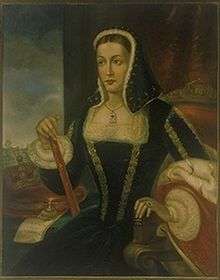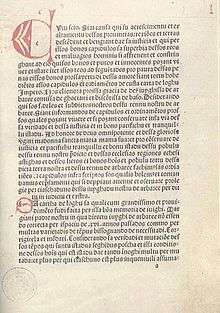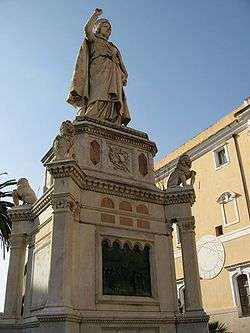Eleanor of Arborea

(portrait of fantasy, A. Caboni 1881)
Eleanor of Arborea (Sardinian: Elianora de Arbaree;[1] Catalan: Elionor d'Arborea); 1347 in Molins de Rei – 1404 in Giudicato of Arborea, was the juyghissa or judikessa ("female judge" or Queen in Sardinian language) of Arborea from 1383 to her death. She was one of the last, most powerful and significant Sardinian judges, as well as the island's most renowned heroine.
Biography

Born at Molins de Rei, Catalonia, Eleanor of Bas-Serra was the daughter of Marianus IV of Arborea, who had become in 1346 iuyghe of Arborea, on the west coast of Sardinia, and his wife Timbora de Rocabertí. It has been said that their family, the Bas, belonged to the House of Visconti. The house of Arborea, whose power extended over about one third of Sardinia, was the only independent part of the island at that point in history. During her childhood, she was raised with a natural tendency towards war and weapons.
Her father married Eleanor to Brancaleone Doria, a Genoese nobleman who held the fief of Castelgenovese, in order to strengthen local alliances. Marianus died in 1376 and was succeeded by his son Hugh III. In March 1383, there was a republican uprising in Arborea and Hugh was murdered. Eleanor defeated the rebels and became regent to her infant son Frederick, who as next male heir became the official monarch of Arborea. For the next four years Arborea was at war with the Crown of Aragon, which claimed the island. It lost much of its Sardinian possessions to Eleanor. Arborea obtained almost all of the island during this war. After rallying Sardinian forces, Eleanor was able to negotiate a favourable treaty. Her eldest son Frederick died during this war and was succeeded by her younger son, Marianus V. An alliance was formed with Genoa which sustained Arborea's independence for another generation. She died in Oristano, Sardinia, in 1404 (or in 1402, as some believe).
Eleanor composed the Carta de Logu, a body of laws which came into force in April 1395. They were considered to be far in advance of the laws of other countries, the penalty for most crimes being a fine, and the property rights of women being preserved. These laws remained in force in Sardinia until the code issued by king Charles Felix in 1827.

Eleanor was particularly interested in ornithology. As a friend of birds, she was the first to legislate protection to a certain species of bird (falcon). Based on this, the Eleonora's falcon (Falco eleonorae) was named after her.
See also
References
Sources
- Caravale, Mario (ed). Dizionario Biografico degli Italiani LXII Dugoni – Enza. Rome, 1993.
- Mearns, Barbara and Richard. Biographies for Birdwatchers. ISBN 0-12-487422-3
- Manno, Giuseppe (1835). Storia di Sardegna. P.M. Visaj.
- Pitzorno, Bianca, Vita di Eleonora d'Arborea, Mondadori, Milan 2010.
- Lupinu, Giovanni. Carta de Logu dell'Arborea, Nuova edizione critica secondo il manoscritto di Cagliari. Centro di Studi Filologici Sardi. 2010. ISBN 9788895701219
- Carta de Logu 15th century Incunable. http://www.sardegnacultura.it/documenti/7_88_20070215114729.pdf
| Preceded by Hugh III |
Judge of Arborea 1383 – 1404 |
Succeeded by Marianus V |